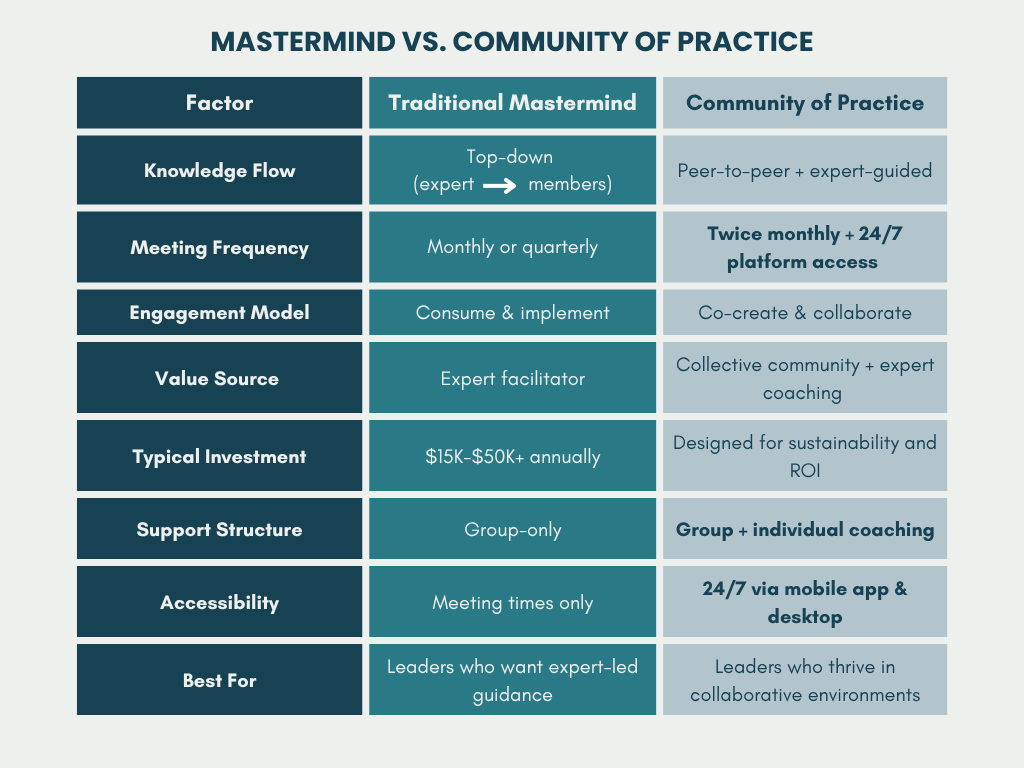Medical Practice Owner Mastermind vs. Community of Practice: Which Is Right for You?
If you're an independent healthcare practice owner looking for business support, you've probably encountered two popular models: physician masterminds and communities of practice.
Both promise peer collaboration, expert guidance, and better business results. But they operate very differently—and choosing the wrong one could cost you time, money, and momentum.
So what's the difference? And more importantly, which model will actually help you scale your practice sustainably?
Let's break it down.
The Hidden Advantage Employed Physicians Have (That You Don't)
Here's what nobody talks about when comparing employed vs. independent practice:
When an employed physician, PT, or psychologist has a question about:
HR issues with a difficult employee
Billing codes for a complex procedure
Marketing strategies for a new service line
Financial projections for next quarter
Contract negotiations with a payer
They have instant access to:
An HR department (just a Slack message away)
A billing team (down the hall)
A marketing director (on Teams)
A CFO (in the next meeting)
A contracts team (one email away)
Plus: They can ping colleagues across the hall, grab coffee with the department head, or drop into a manager's office for real-time problem-solving.
Now, what happens when YOU—an independent practice owner—have the same question?
You Google it at midnight.
You second-guess yourself.
You piece together advice from blog posts and Facebook groups.
You make your best guess and hope it works out.
You go it alone.
The Infrastructure Gap
Employed physicians have something invaluable that independent practice owners often lack: infrastructure for instant support.
It's not just about expertise—it's about accessibility.
When you own your practice, you trade corporate bureaucracy for autonomy. That's a good trade! But you also lose the built-in support system that comes with being part of a larger organization.
Until now.
A well-designed community of practice doesn't just give you peer support and expert coaching—it recreates that instant-access infrastructure that employed physicians take for granted.
Imagine having:
A question about staff retention at 10pm? → Post in the platform, get real answers from practice owners who've solved it
Stuck on a financial decision before your Monday meeting? → Weekend access to your community's collective wisdom
Need a template for something HR-related? → Search the resource library from your phone
Want to vent about a frustrating payer situation? → Jump into the app and find people who GET IT
This is what levels the playing field.
Independent practice ownership shouldn't mean going it alone. It should mean having the freedom to run your practice YOUR way—with the infrastructure and support to actually succeed.
What Is a Medical Practice Owner Mastermind?
The mastermind concept dates back to Napoleon Hill's 1937 book Think and Grow Rich, where he described it as "the coordination of knowledge and effort between two or more people who work toward a definite purpose in a spirit of harmony."
In the healthcare world, physician masterminds typically involve:
A group of independent practice owners (usually 6-12 people)
Regular meetings (monthly or quarterly) to discuss challenges and strategies
Expert-led content or guest speakers
Accountability and goal-setting
Often specialty-specific or revenue-tiered
The traditional mastermind model follows a top-down structure: One facilitator or expert leads the group, members share updates and challenges, and the group provides feedback and accountability.
The Strengths of Practice Owner Masterminds
✅ Structured accountability - Regular check-ins keep you on track
✅ Expert facilitation - A skilled leader guides conversations productively
✅ Curated peer groups - Members are vetted for similar experience levels
✅ High commitment - The investment ensures serious participants
The Limitations of Traditional Masterminds
❌ One-way knowledge flow - Expertise flows from the top down, not peer-to-peer
❌ Passive consumption - Members often consume advice rather than co-create solutions
❌ Guru-dependent - The value lives with the facilitator, not the community
❌ Limited engagement - Monthly or quarterly meetings mean sparse touch points
❌ Expensive - Premium pricing can be prohibitive, especially for solo practice owners
Bottom line: Physician masterminds can be powerful, but they're built on a model where one expert dispenses wisdom and members implement individually.
What Is a Community of Practice?
A community of practice (CoP) is a collaborative learning model where members share expertise, co-create solutions, and build collective knowledge around a common domain.
The term was coined by learning theorists Jean Lave and Etienne Wenger in 1991. Unlike masterminds, communities of practice aren't top-down—they're peer-driven and collaborative.
A healthcare community of practice includes:
Members who share a common professional interest (independent practice ownership)
Regular interaction and knowledge sharing
Collaborative problem-solving (crowdsourced wisdom, not guru-led)
Shared resources, tools, and frameworks
A sense of collective ownership and identity
The key difference? In a community of practice, members learn WITH and FROM each other, not just from a single expert.
The Three Elements of a True Community of Practice
According to Wenger, every CoP has three core components:
Domain - A shared area of interest or expertise (in this case, independent healthcare practice ownership)
Community - Relationships and trust built through regular interaction
Practice - Shared resources, experiences, and knowledge that members apply to their work
The Strengths of Communities of Practice
✓ Flexible engagement - Twice-monthly meetings (won't overwhelm your schedule) + 24/7 platform access when you need support
✓ Multiple learning modes - Structured facilitated sessions + open discussion + private coaching
✓ Peer-to-peer learning - Solutions come from collective wisdom, not one guru
✓ Co-creation - Members actively contribute and shape the community
✓ Individual support - Private coaching sessions ensure personalized guidance
✓ Cross-pollination - Diverse specialties bring unexpected solutions
✓ More accessible - Designed to be sustainable for solo and small group practices
The Potential Limitations
𝑿 Requires active participation - You get out what you put in
𝑿 Less hierarchical structure - Some people prefer clear expert-led guidance
𝑿 Needs strong facilitation - Without good design, CoPs can lose focus
Bottom line: Communities of practice are built on collaboration and shared ownership. The expertise doesn't live with one person—it's distributed across the entire group.
Side-by-Side Comparison: Mastermind vs. Community of Practice
Comparison table showing differences between traditional physician mastermind and community of practice models for independent healthcare practice owners.
This combination means you're never alone—and the overwhelm becomes manageable with the right frameworks and support.
Which Model Is Right for Your Practice?
The honest answer? It depends on how you learn best and what stage your practice is in.
Choose a Traditional Mastermind If You:
Prefer structured, expert-led guidance
Want a small, curated group of similar practice owners
Have budget for premium pricing (often $15K-$50K+ annually)
Thrive with hierarchical learning (expert teaches, you implement)
Want quarterly deep dives rather than more frequent touch points
Value exclusivity and small group dynamics
Choose a Community of Practice If You:
Learn best through collaboration and peer exchange
Want ongoing support without overwhelming your schedule
Value diverse perspectives across specialties and practice models
Prefer co-creating solutions rather than consuming expert advice
Want sustainable pricing that delivers strong ROI
Believe the best ideas come from collective wisdom, not one guru
Want to contribute your expertise, not just receive it
Need 24/7 access to support (not just scheduled meeting times)
Here's the truth most won't tell you: You don't need a $50K+ mastermind to grow a thriving practice.
What you need is consistent peer support, strategic frameworks, infrastructure for instant access, and a community that gets the unique challenges of independent healthcare practice ownership.
Real Talk: What Independent Practice Owners Actually Need
After 15+ years of working with independent practice owners across healthcare, here's what I've learned:
Most practice owners don't need another guru telling them what to do.
You're already a clinical expert. You're intelligent, capable, and resourceful.
What you need is:
Strategic frameworks that account for healthcare's unique complexity
Peer support from people who understand your challenges firsthand
Flexible touch points that work with your schedule (not weekly meetings that add to overwhelm)
A community you can access 24/7—because practice challenges don't wait for the next scheduled call
Individual coaching when you need personalized guidance
Sustainable pricing that delivers ROI without draining your practice budget
That's why Thriving Practice Community combines the structure of expert-led facilitation with the flexibility of peer-driven collaboration.
You get twice-monthly meetings (one structured, one open forum), 24/7 platform access via mobile app and desktop, plus private coaching sessions—so you have support exactly when and how you need it.
It's not either/or. It's both/and.
The Bottom Line
Traditional physician masterminds can be valuable—especially if you thrive in expert-led, hierarchical environments and have the budget for premium pricing.
Communities of practice offer a more collaborative, sustainable, and accessible model where peer wisdom and expert guidance work together—with the infrastructure for instant support that employed practitioners take for granted.
The best choice? Whichever model aligns with how you learn, what your practice needs, and what you can sustain financially.
For independent practice owners who want autonomy without isolation, business strategy without burnout, and peer support without schedule overwhelm—a well-designed community of practice might be exactly what you've been looking for.
Your Next Step
If you're an independent healthcare practice owner who's tired of going it alone—and ready for a community that fits your actual schedule—we'd love to have you.
Thriving Practice Community is a global community of practice for physicians, physical therapists, naturopaths, psychologists, and other independent healthcare practitioners who want to scale sustainably—without the burnout.
We're not a traditional mastermind. We're a flexible, collaborative learning environment where you get:
Twice-monthly group sessions (one structured facilitated discussion, one open forum)
24/7 community platform access (mobile app + desktop, so you get support on your schedule)
Four private coaching sessions (personalized strategic guidance for your specific challenges)
Expert-led resources and frameworks (the business strategies that actually work in healthcare)
A global network of practice owners who become your competitive advantage
Are you ready to experience the difference?
Learn more about Thriving Practice Community
Have questions about masterminds vs. communities of practice? Reach out—we're happy to help you find the right fit for your practice.
Do you have sufficient support? At Tracy Cherpeski International and Thriving Practice Community, we're committed to supporting independent healthcare practice owners in achieving extraordinary success without sacrificing well-being. Whether through educational resources like this blog, community support, or personalized guidance, we're here to help you on your journey to a more balanced, fulfilling career in healthcare practice ownership. Let’s talk! Click here to schedule your complimentary practice assessment strategy session.
About the Author
Tracy Cherpeski, MBA, MA, CPSC, is a business consultant, executive coach, and leadership development expert. Her mission is to unlock the potential for success in every individual and organization she works with. With a background in operations and a passion for driving growth, she approaches each engagement with professionalism and a keen eye for optimizing structures, processes, and productivity to boost profitability.
Tracy's coaching, consulting, and training programs are designed to provide a holistic experience, integrating leadership development, executive coaching, and mindset mastery. Her expertise has been sought after by small business owners, industry groups, networking organizations, government agencies, and corporations alike.
Originally hailing from the Pacific Northwest, Tracy now calls Chapel Hill, North Carolina, her home. Wherever she goes, her commitment to helping people and organizations reach their full potential remains unwavering.


